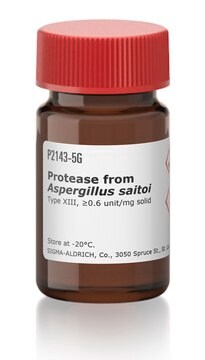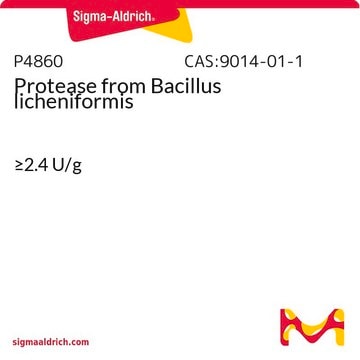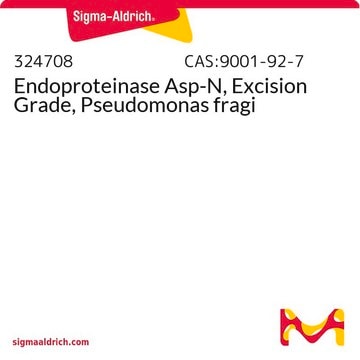P4630
Protease from bovine pancreas
Type I, ≥5 units/mg solid
Sign Into View Organizational & Contract Pricing
All Photos(4)
About This Item
CAS Number:
EC Number:
MDL number:
UNSPSC Code:
12352204
eCl@ss:
32160410
NACRES:
NA.54
Recommended Products
biological source
bovine pancreas
Quality Level
type
Type I
form
powder
specific activity
≥5 units/mg solid
storage temp.
−20°C
Application
Protease is an enzyme used to break down proteins by hydrolyzing peptide bonds. Protease is used to degrade proteins, to study protease inhibitors and to study thermal inactivation kinetics. Product P4630 is from bovine pancreas. Protease from bovine pancrease (type I) has been used for the extraction of hemicellulose.
Biochem/physiol Actions
Protease catabolizes proteins by hydrolysis of peptide bonds. Proteases are inactivated by serine active-site inhibitors, such as phenylmethylsulfonyl fluoride (PMSF) and diisopropylfluorophosphate.
Quality
Crude
Unit Definition
One unit will hydrolyze casein to produce color equivalent to 1.0 μmole (181 μg) of tyrosine per min at pH 7.5 at 37 °C (color by Folin-Ciocalteu reagent), unless otherwise indicated.
Signal Word
Danger
Hazard Statements
Precautionary Statements
Hazard Classifications
Eye Irrit. 2 - Resp. Sens. 1 - Skin Irrit. 2 - STOT SE 3
Target Organs
Respiratory system
Storage Class Code
11 - Combustible Solids
WGK
WGK 1
Flash Point(F)
Not applicable
Flash Point(C)
Not applicable
Personal Protective Equipment
dust mask type N95 (US), Eyeshields, Gloves
Certificates of Analysis (COA)
Search for Certificates of Analysis (COA) by entering the products Lot/Batch Number. Lot and Batch Numbers can be found on a product’s label following the words ‘Lot’ or ‘Batch’.
Already Own This Product?
Find documentation for the products that you have recently purchased in the Document Library.
Customers Also Viewed
Cosmin Butnarasu et al.
Advanced healthcare materials, 11(15), e2200340-e2200340 (2022-05-25)
Mucus is a complex barrier for pharmacological treatments and overcoming it is one of the major challenges faced during transmucosal drug delivery. To tackle this issue, a novel class of glycosylated nanoparticles, named "mucosomes," which are based on the most
Werend Boesmans et al.
Glia, 67(6), 1167-1178 (2019-02-08)
Coordination of gastrointestinal function relies on joint efforts of enteric neurons and glia, whose crosstalk is vital for the integration of their activity. To investigate the signaling mechanisms and to delineate the spatial aspects of enteric neuron-to-glia communication within enteric
P A Hedin et al.
The Journal of nutrition, 124(12), 2458-2465 (1994-12-01)
The southwestern corn borer, Diatraea grandiosella Dyar, is a major pest of corn, Zea mays L., in the southern United States. To search for plant allelochemicals, chemically defined insect diets are commonly used, but southwestern corn borer larvae did not
U Klöckner
Pflugers Archiv : European journal of physiology, 424(3-4), 231-237 (1993-08-01)
Calcium-activated chloride currents were studied by the patch-clamp technique in vascular smooth muscle cells (VSMC) isolated from human mesenteric arteries. Bath application of 20 mM caffeine caused the cell membrane to depolarize by a calcium-activated inward current that peaked to
Nir Qvit et al.
Pharmaceuticals (Basel, Switzerland), 15(3) (2022-03-27)
Myocardial infarction is the leading cause of cardiovascular mortality, with myocardial injury occurring during ischemia and subsequent reperfusion (IR). We previously showed that the inhibition of protein kinase C delta (δPKC) with a pan-inhibitor (δV1-1) mitigates myocardial injury and improves
Our team of scientists has experience in all areas of research including Life Science, Material Science, Chemical Synthesis, Chromatography, Analytical and many others.
Contact Technical Service














